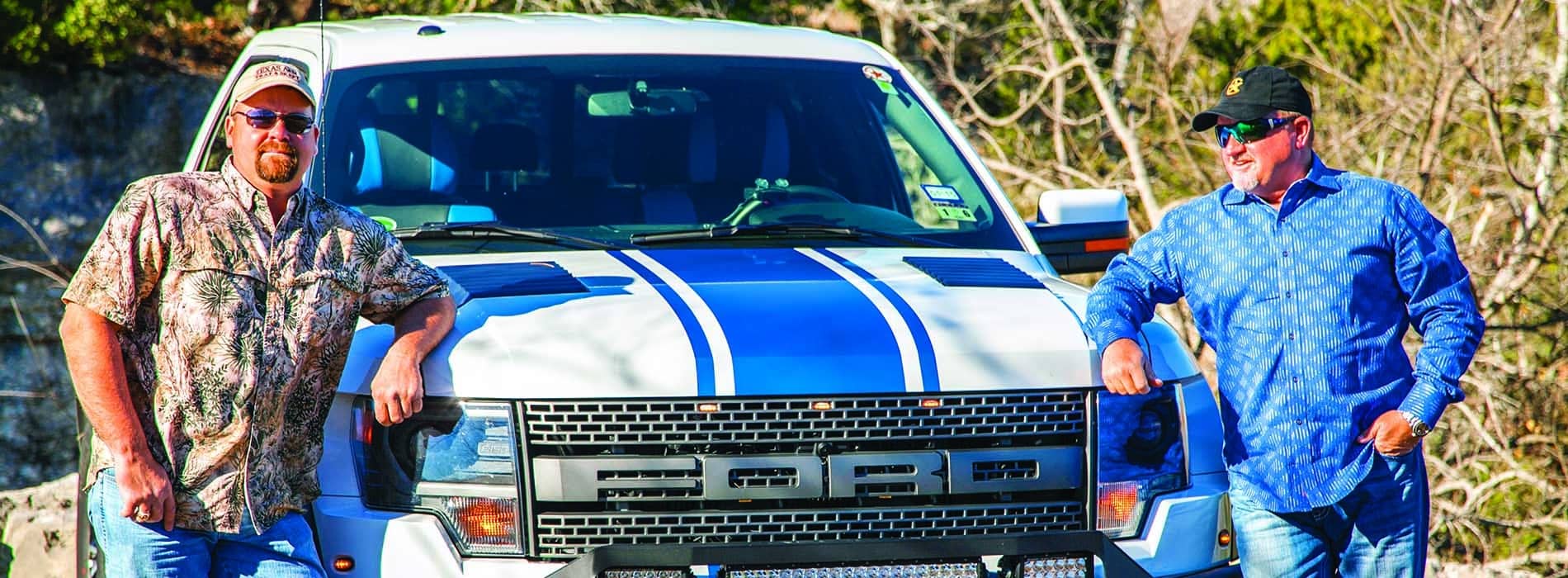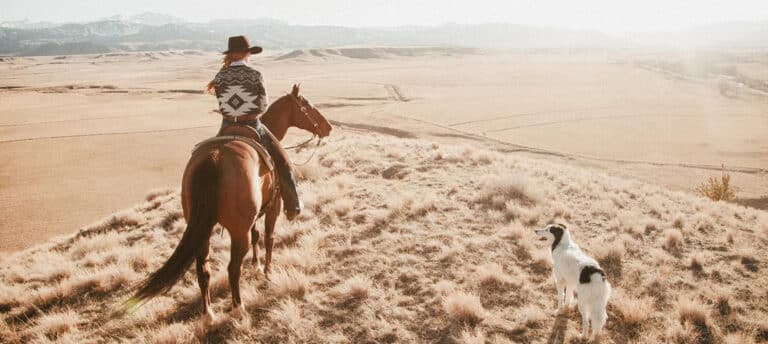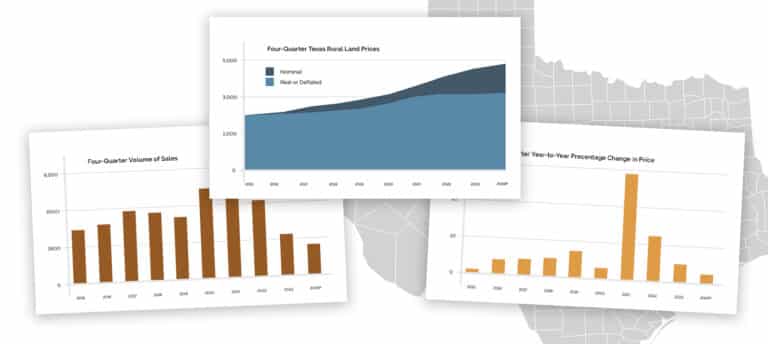It is no secret that Trip duPerier, the Texas Landman, knows how to sell ranches. As part of the duPerier team, Trey Hallmark and Kevin Meier have worked with—and learned from—Trip for more than a decade. Their professional relationship, built on shared knowledge and experience, has translated into ranch sales that consistently close over $300 million annually. While the destination to become top ranch brokers was the same, their paths to get there were different.
Trey grew up in a real estate family with both parents working in the industry. His mother, Susan Hallmark, ran Hallmark Bradfield, which at one point was San Antonio’s largest real estate company.
“All I ever knew was real estate, which meant I always knew my career would be in real estate,” said Trey, who graduated from TCU. “It wasn’t until I finished my undergraduate degree along with the TCU Ranch Management program that I knew I wanted to sell ranches instead of houses.”
Kevin, who graduated from Texas A&M in 1995 with a degree in wildlife biology came to ranch real estate through his career as a wildlife biologist. Wildlife management kept him on the land and in touch with people who wanted to buy it and sell it. He devoted a lot of time and expertise to obtaining wildlife management permits for landowners from the Texas Parks and Wildlife Department.
“Showing a state biologist around a ranch for permitting purposes requires a different depth of knowledge than showing a ranch to a potential client,” Kevin, who owns five working farms and ranches, said. “The key to my success is the in-depth knowledge I have about land. I’m not a salesman by any means, but I really do know dirt—and clients appreciate that.”
View Trip duPerier’s land listings on Land
After years of being an informal advisor and with Trip’s urging, Kevin joined the duPerier team full time as a ranch realtor in 2011.
While the team first staked its claim in Texas, the brokerage also works in New Mexico and the western mountain states. The overall goal is delivering exactly what the client wants.
“We build strong relationships with our clients, so when they decide they want another property they call us,” Trey said. “When those calls come, we jump in the truck and go spend a week looking at options. We travel, so we know first-hand what’s available and what will fit our clients’ needs.”
The second part of the client care equation is market knowledge.
“In order to really serve your clients, you have to know the market—what’s out there, what’s for sale, what it sold for, and what the values are,” he said.
The third part of the superlative customer service is promptness.
Kevin said, “When clients are interested in land, promptness is essential. You can’t wait around for things to happen. You have to take care of the details, even if it means staying up round-the-clock, to get the deal done.”
Kevin and Trey have mastered these crucial details giving them the opportunity to work with exceptional properties and interesting people.
Most recently, Kevin was involved in selling the “Old Hendricks Boys’ Ranch” near Stamford, which was held in a trust managed by JP Morgan. The 43,000-acre property boasts 36 miles of the Clear Fork of the Brazos River running through it.
“There was a lot of history on that ranch, so it was fulfilling to be involved in writing its next chapter,” he said.
While the land always has a story, the people do as well.
Trey said, “Of course I find the land interesting, but it’s really about the people for me.” In his career he’s represented high-profile clients including singers, actors, professional athletes, owners of major vineyards, and stables that house Kentucky Derby and Belmont Stakes winners.
Ranch real estate involves both natural resources and people, so there is a level of unpredictability that makes the job unlike any other.
On one occasion, Trey was showing a ranch in far west Texas when a mountain lion began to trail the group. The lion seemingly had a meal on its mind and followed a bit too closely for everyone’s comfort. Fortunately, Trey was prepared with a sidearm and dispatched the mountain lion before tragedy could occur.
“I sold the ranch, then had the mountain lion mounted as a gift to the ranch’s new owner,” Trey said.
One of Kevin’s most memorable experiences occurred in east Texas as he was showing a 5,500-acre timber tract in San Jacinto County. Despite assurances from the land manager that the property was not being actively hunted, Kevin kept seeing signs of hunting activity, including blinds, filled deer feeders, and human tracks throughout.
Taking the manager at his word, Kevin brought potential clients to the land, relaying the information the land was not being hunted. When the group started to tour one of the property’s cabins, they came face to face with hunters.
“Apparently, the manager had been claiming ownership of the property and leasing it out to hunters unbeknownst to the actual landowner,” Kevin said. “It was definitely one of the most awkward and uncomfortable moments in my career.”
As industry veterans, Trey and Kevin have witnessed changes through the years. According to Trey, the biggest changes are due to technological advancement.
“For years, we worked with spiral notebooks and number two pencils,” Trey said. “Nothing is the same now. Technology has changed the way we do everything from mapping properties to marketing them. Wireless internet, portability of our personal computers, social media and numerous other developments have revolutionized the industry.”
Kevin, on the other hand, noted changes in the reasons clients are purchasing property.
“I’ve watched real estate for 20 years,” he said. “In the nineties, urban Texans, particularly Houstonites, were buying ranches for recreation, shifting land use from agriculture to recreation. In the past three years though, people have been interested in properties with cultivatable fields, irrigation, or productive cattle country.”
He continued, “I think part of the change comes from global unrest. People want to be able to be more self-sufficient.”
Both men are bullish on the industry and its prospects as 2015 unfolds. According to Kevin, the market is strong.
“Last year, while our third quarter was successful, the fourth quarter exceeded that success,” he said. “This year already is following the fourth quarter trend.”
Trey noted the benefit of being in Texas.
“I think Texas and what we’ve done in the past 10 years as far as job creation and the economy compared to other states is pretty much what has kept the country going,” Trey said. “We have strong personal property rights and people moving in for tax purposes. I might be nervous if I were any place else, but I feel good about being in Texas.”
Owning land anywhere in Texas makes good financial sense.
Kevin said, “It’s a tangible asset, but it can’t be reproduced. I personally invest in land. There’s no one in New York City who is going to turn around tomorrow and tell me that it’s only worth a dollar an acre. Unlike the stock market, there is a real market where I can take land any day of the week and get a fair market price.”
Trey added, “Land, especially in Texas, is always likely to be an appreciable asset. Buy the right piece of land at the right price and it will appreciate over time. Plus, there are tax benefits and a potential of enterprises from livestock to wildlife.”
Owning land in Texas also makes sense on an emotional level. It gives people a place to put down roots.
“The biggest benefit of land ownership is the lifestyle that comes with it—the ability to go outdoors and be on the land, working it and eventually becoming part of it,” Trey said. “It grounds people in everything that is important.”
View Trip duPerier’s land listings on Land
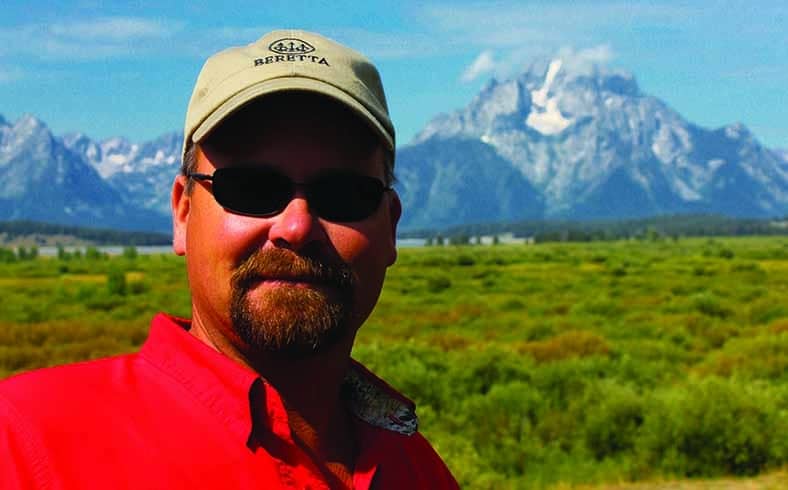
Kevin Meier biography
Born: Texas City, Texas 1972
Parents: Ronald and Sheila Meier
Wife: Julie Meier
Children: Garrett (12), Lauren (8)
College: Texas A & M, Degree in Wildlife Biology
What is the thing in life you are most proud of?
My wife and my kids.
If you had to pick another career, what would you do?
I got where I am today by working hard my whole life. If somebody said I couldn’t sell ranches anymore, I think I would go back to farming, ranching and being a wildlife biologist. Frankly, if there were something else I wanted to do, I’d be doing it.
What is your favorite thing about Texas?
The wide open spaces. I drive all over the state from ranch to ranch. When I get on these small highways or farm-to-market roads, I can focus on my job, the ranch, or just the beauty around me. I don’t have to contend with city chaos or traffic hassles. That’s what I love.
My favorite:
- Restaurant: Don Shula’s in Key West
- Road: Highway 16
- Body of Water: Guadalupe River
- “Watering” Hole: Dixie Chicken in College Station
- Dance Hall: The Cabaret in Bandera
- Secret Spot: My shop (I enjoy building things.)
Top five things on the “must do” list:
- Go on an African cape buffalo safari
- Compete in the Nad Al Sheba Sporting Clays Championship in Dubai, United Arab Emirates
- Tour Egypt
- Visit the castles of Europe
- Learn to fly a helicopter
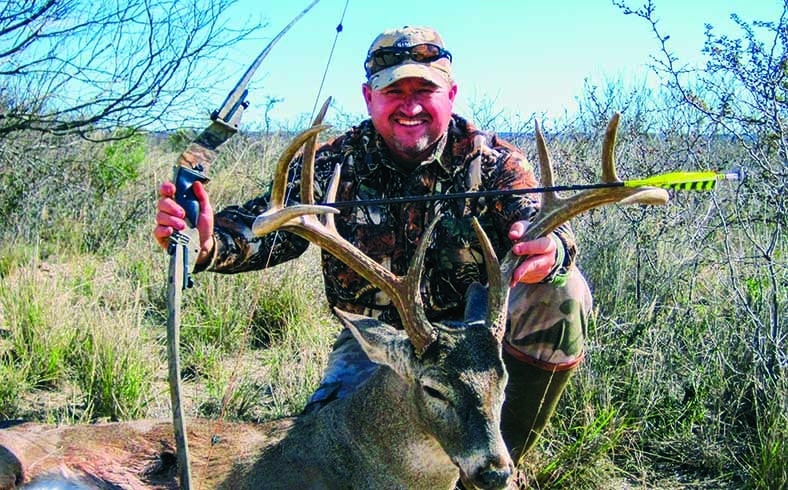
Trey Hallmark biography
- Born: San Antonio, Texas 1966
- Parents: Denny and Susan Hallmark
- Wife: Leslee Hallmark
- Children: Kirsten 16, Braden 13
- College: TCU, degree in General Studies and Ranch Management
What is the thing in life you are most proud of?
I would say my family. I was probably the last person anyone thought would settle down and have a family. I waited a long time to do it. I work very hard to play very hard and I’m not home very often. I have a great wife who understands who I am and how I operate. She deserves a lot of credit.
If you had to pick another career, what would you do?
I’d be a professional golfer. I was probably good enough to make it, but I had a really big problem with hunting and fishing. I never focused on golf enough to see to what level I could take my game. There are a lot of fellows who I used to beat in college who are making significant money on the Tour right now.
My favorite:
- Restaurant: Panjo’s Pizza in Rockport
- Road: Texas Highway 337 between Medina and Vanderpool
- Body of Water: The Laguna Madre
- “Watering” Hole: Anywhere on a boat
- Dance Hall: John T. Floore’s Country Store in Helotes
- Secret Spot: Big Shell (You don’t get the specifics, they’re mine.)
Top five things on the “must do” list:
- Make more money
- Sell more ranches
- Hunt more
- Fish more
- Play golf at the Augusta National Club
